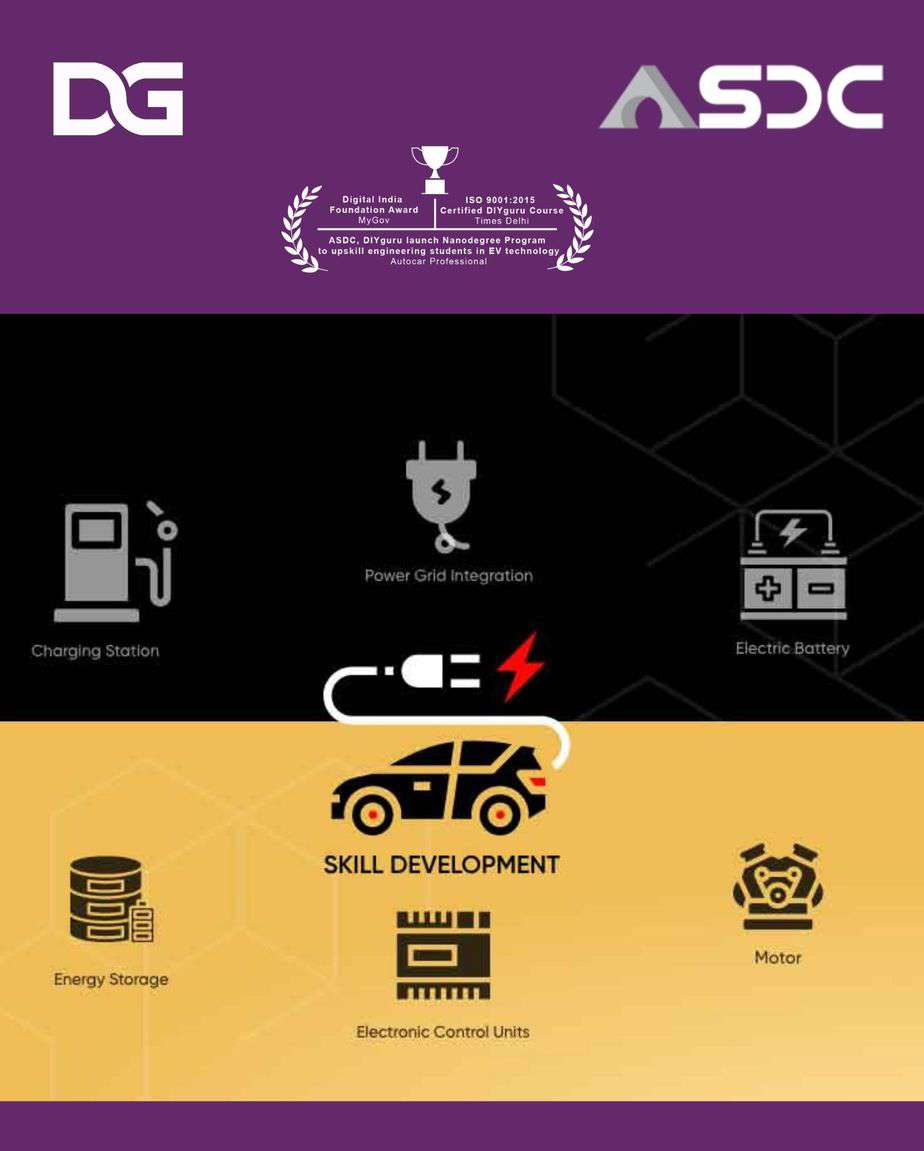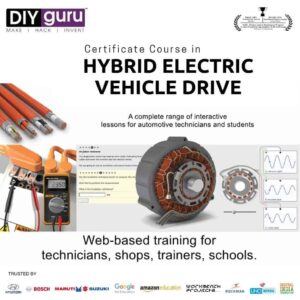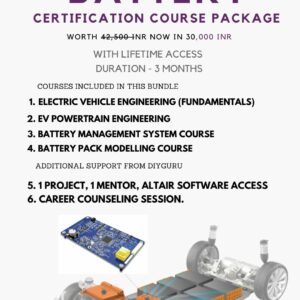Description
Course 1
ELECTRIC VEHICLE FUNDAMENTAL COURSE (FUTURE MOBILITY)
ELECTRIC VEHICLE FUNDAMENTAL COURSE (FUTURE MOBILITY)
Fundamental (Electrical) | |
Introduction | |
History of Electric Vehicle | |
Pre-requisite | |
Calculating the Electrical Unknowns of a DC Parallel Circuit | |
Analyzing Time-Series Data for Distance, Speed, and Acceleration | |
Design Phase | |
Motors | |
Batteries | |
Converter, Inverter, Controls and Controllers | |
Describing Inverter Functions in Electric and Hybrid Vehicles | |
Working Safely on Electric and Hybrid Electric Vehicle Components | |
Assignment | |
Fundamental (Mechanical) | |
| |
Course 2
BMS – BATTERY MANAGEMENT SYSTEM CERTIFICATION COURSE
BMS – BATTERY MANAGEMENT SYSTEM CERTIFICATION COURSE
Battery Management System | |
Get Started with SIMULINK | |
Modelling and Simulation | |
Course 3
Design of EV Using MATLAB
Design of EV Using MATLAB
1.Road Loads | |
2.Power Converters in Electric Vehicles | |
3. Inverters in Electric Vehicles | |
5. Modelling of Electric Vehicle | |
6. State of Charge(SOC) Estimatio | |
7. Battery Management Systems(BMS | |
Course 4
Battery Pack Modelling
Battery Pack Modelling
Battery Parameters | |
Lithium Ion Characteristics | |
Electrical Design | |
Mechanical Design | |
Heat Transfer | |
Thermal Design of battery pack | |
Battery pack assembling and test | |
Thermal Analysis on Battery pack | |
Course 5
Basics of Electrical Engineering for Electric Vehicle
Basic of Electrical Engineering for Electric Vehicle
Basic Electricals | |
4. EV Architectures | |
5. Motors | |
Course 6
Python Programming Language for Mechanical & Electrical Engineers
Python Programming Language for Mechanical & Electrical Engineers
Introduction | |
Flow Control | |
Functions | |
Handling errors | |
Lists | |
For Loops with Lists, Multiple Assignment, and Augmented Operators | |
Dictionaries | |
Strings | |
Regular expressions | |
Course 7
Electric Vehicle Powertrain Engineering (Advanced)
Electric Vehicle Powertrain Engineering (Advanced)
Introduction to Electric Vehicle Powertrain | |
Nomenclature & Understanding Calculation for EV Components | |
Power conditioning and Filtering | |
Power, Voltage Conversion | |
Motor Controls | |
Modelling of Powertrain Components in in SOLIDWORKS and Analysis in ANSYS | |
Battery Management System | |
Getting started with Simulink | |
Thermal Management | |
Modelling and Simulation | |
Reference Books | |
Certification Partner – ASDC (Automotive Skills Development Council), Govt. of India
Course Duration – Self paced
Eligibility Criteria – Graduates (10+2+3) from a recognized university in any discipline, working professionals can undergo this course at the comfort of their time.
About Us:
DIYguru, India’s most prominent and leading EV Technology Course provider working with Robert Bosch, Hyundai, DFID Govt. of UK, IIT Delhi, IIT Bombay among others in training individuals and has been working towards providing a trained workforce in this industry which is estimated to grow 30 million by 2025.
We are partners of NITI Aayog, Atal Innovation Mission & ASDC (Automotive Skills Development Council, Govt. of India) in Electric Mobility Vision 2030.
Our Electric Vehicle Online Course has recently been impanelled by National Educational Alliance for Technology, NEAT – AICTE in 2021 with global certification to make students from Engineering Colleges job-ready.
Not only this, DIYguru has recently been accredited as the official partner of ISRO in the implementation of Online Courses in Space Remote Sensing Satellite in India.
The alumni of DIYguru has been setting trends in the Automotive, Data Analytics & Product Development Industry worldwide with a success rate of more than 94%. See Here at YouTube & Linkedin.
Placement Assistance:
DIYguru provides placement assistance by providing an enormous amount of technical knowledge about the corresponding field and latest information about tech-trends. Information on new vacancies is float through e-mails by our support team to every student, so that you can apply for the job as early as possible. India has chalked a plan to aid its electric mobility mission by creating a specialized workforce. The blueprint aims at generating 10 million jobs. The government had initiated the National Electric Mobility Mission Plan in the year 2013 with an objective to put 6-7 million electric vehicles on Indian roads by 2020 and committing to achieving 30% e-mobility in the country by 2030. DIYguru has a direct tie-up with Industries. The students / professional performing outstandingly in this course will get the opportunity to build a career in the E-Mobility sector.
FAQs
Is it okay if I register now and start the course when i have the available time?
– Yes you can
Is this self-paced learning or does the course have live classes?
– – It’s a blend of a self-paced and live class. i.e. you will have access to recorded video lectures as well as live classes. In a total of 2 hours of the recorded video lecture and 2 hrs. of the live sessions every week. We give a live doubt clearing class to clear your doubts. The live classes happen in batches, you will be notified prior via email.
Technical Requirements
The program to give its best will need the following requirements:
- Computer/ Laptop will provide you with the best experience, but this program is quite compatible with smartphones to make it feasible for students worldwide.
- High-speed internet for crystal clear experience, but this program can also run without buffering with below-average connectivity for reaching out to students from suburban and rural areas.
- A student should make their notes for future reference.
- A student should have basic knowledge about high-school physics and chemistry, even though the pre-requisite of this program will brush up one’s basic concepts.
Mode of Teaching
This program is offered as a self-paced program often referred to as an asynchronous online program which is time-independent, meaning that it can be accessed 24X7 within the tenure of 6 Months. This program can be accessed from multiple devices which makes it easy to learn on the go. Lectures are pre-recorded or slide presentation with voice-over commentary, interactive discussion boxes that foster student to student interaction, Email communication with the instructor are part of this process. Downloadable educational tools such as e-books, research papers, and government reports are made available at just one click.
Course Objective:
This course follows the practical approach of learning (PLA model) to educate and offer cutting edge training to prepare engineers for the future industry workforce demand.
- Make Participants more employable.
- Prepare participants to match up with the industry 4.0 revolution.
- Bridge the gap between conventional methods of learning and application-based method of learning.
- To empower participants with the skills to face future challenges.
Certification:
HOW can you earn a certificate?
DIYguru will feel proud to awards the Degree of competency in ‘INDUSTRY 4.0 Skill Development Program’ to only those aspirants who have 100% completed their online module and passed the final examination.
WHAT is the value of this degree in the market?
DIYguru proficiency degree is highly valuable by industry giants namely Robert Bosch; Maruti Suzuki; Hyundai Motors, are the name of few, which is why DIYguru earnt degree, are secured with a unique certificate ID. To check the validation of the degree, check out the footer section of the home page.
















